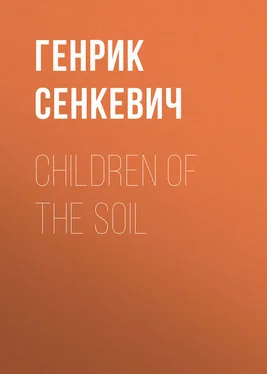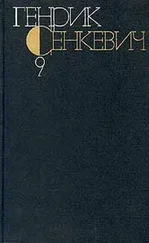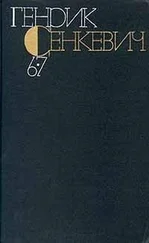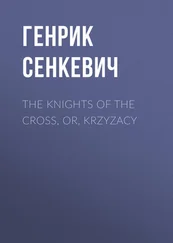Генрик Сенкевич - Children of the Soil
Здесь есть возможность читать онлайн «Генрик Сенкевич - Children of the Soil» — ознакомительный отрывок электронной книги совершенно бесплатно, а после прочтения отрывка купить полную версию. В некоторых случаях можно слушать аудио, скачать через торрент в формате fb2 и присутствует краткое содержание. Жанр: foreign_antique, foreign_prose, на английском языке. Описание произведения, (предисловие) а так же отзывы посетителей доступны на портале библиотеки ЛибКат.
- Название:Children of the Soil
- Автор:
- Жанр:
- Год:неизвестен
- ISBN:нет данных
- Рейтинг книги:5 / 5. Голосов: 1
-
Избранное:Добавить в избранное
- Отзывы:
-
Ваша оценка:
- 100
- 1
- 2
- 3
- 4
- 5
Children of the Soil: краткое содержание, описание и аннотация
Предлагаем к чтению аннотацию, описание, краткое содержание или предисловие (зависит от того, что написал сам автор книги «Children of the Soil»). Если вы не нашли необходимую информацию о книге — напишите в комментариях, мы постараемся отыскать её.
Children of the Soil — читать онлайн ознакомительный отрывок
Ниже представлен текст книги, разбитый по страницам. Система сохранения места последней прочитанной страницы, позволяет с удобством читать онлайн бесплатно книгу «Children of the Soil», без необходимости каждый раз заново искать на чём Вы остановились. Поставьте закладку, и сможете в любой момент перейти на страницу, на которой закончили чтение.
Интервал:
Закладка:
To this Plavitski answered with a certain cordial dignity, “No, my boy. To-day is Sunday; and besides, family feeling should go before business. To-day I greet thee, and receive thee as a blood relative; to-morrow, if thou wish, appear as a creditor. That is it. To-day my Stas has come to me, the son of my Anna. Thus will it be till to-morrow; thus should it be, Stas. This is said to thee by thy eldest relative, who loves thee, and for whom thou shouldst do this.”
Pan Stanislav frowned a little, but after a while he answered, “Let it be so till to-morrow.”
“Anna spoke through thee then. Dost smoke a pipe?”
“No, only cigarettes.”
“Believe me, thou doest ill. But I have cigarettes for guests.”
Further conversation was interrupted by the rattle of an equipage at the entrance.
“That is Marynia, who has come from early Mass,” said Plavitski.
Pan Stanislav looked out through the window, and saw a young lady in a straw hat stepping out of the equipage.
“Hast made the acquaintance of Marynia?” asked Plavitski.
“I had the pleasure yesterday.”
“She is a dear child. I need not tell thee that I live only for her – ”
At that moment the door opened, and a youthful voice asked, “May I come in?”
“Come in, come in; Stas is here!” answered Plavitski.
Marynia entered the chamber quickly, with her hat hanging by ribbons over her shoulder; and when she had embraced her father, she gave her hand to Pan Stanislav. In her rose-colored muslin, she looked exceedingly graceful and pretty. There was about her something of the character of Sunday, and with it the freshness of that morning, which was bright and calm. Her hair had been ruffled a little by her hat; her cheeks were blooming; and youth was breathing from her person. To Pan Stanislav, she seemed more joyous and more shapely than the previous evening.
“High Mass will be a little later to-day,” said she to her father; “for immediately after Mass the canon went to the mill to prepare Pani Siatkovski; she is very ill. Papa will have half an hour yet.”
“That is well,” said Plavitski; “during that time thou wilt become more nearly acquainted with Stas. I tell thee, drop for drop like Anna! But thou hast never seen her. Remember, too, Marynia, that he will be our creditor to-morrow, if he wishes; but to-day he is only our relative and guest.”
“Very well,” answered the young lady; “we shall have a pleasant Sunday.”
“You went to sleep so late yesterday,” said Pan Stanislav, “and to-day you were at early Mass.”
She answered merrily, “The cook and I go to early Mass that we may have time afterward to think of dinner.”
“I forgot to mention,” said Pan Stanislav, “that I bring you salutations from Pani Emilia Hvastovski.”
“I have not seen Emilia for a year and a half, but we write to each other often. She is about to visit Reichenhall, for the sake of her little daughter.”
“She was ready to start when I saw her.”
“But how is the little girl?”
“She is in her twelfth year; she has grown beyond measure, and is pale. It does not seem that she is very healthy.”
“Do you visit Emilia often?”
“Rather often. She is almost my only acquaintance in Warsaw. Besides, I like Pani Emilia very much.”
“Tell me, my boy,” inquired Plavitski, taking a pair of fresh gloves from the table, and putting them into a breast-pocket, “what is thy particular occupation in Warsaw?”
“I am what is called an ‘affairist;’ I have a commission house in company with a certain Bigiel. I speculate in wheat and sugar, sometimes in timber; in anything that gives profit.”
“I have heard that thou art an engineer?”
“I have my specialty. But on my return I could not find occupation at any factory, and I began at mercantile transactions, all the more readily that I had some idea of them. But my specialty is dyeing.”
“How dost thou say?” inquired Plavitski.
“Dyeing.”
“The times are such now that one must take up anything,” said Plavitski, with dignity. “I am not the man to take that ill of thee. If thou wilt only retain the honorable old traditions of the family, no occupation brings shame to a man.”
Pan Stanislav, to whom the appearance of the young lady had brought back his good nature, and who was amused by the sudden “grandezza” of the old man, showed his sound teeth in a smile, and answered, —
“Praise God for that!”
Panna Plavitski smiled in like manner, and said, “Emilia, who likes you very much, wrote to me once that you conduct your business perfectly.”
“The only difficulty in this country is with Jews; still competition is easy. And with Jews it is possible to get on by abstaining from anti-Semitic manifestoes. As to Pani Emilia, however, she knows as much about business as does her little Litka.”
“Yes; she has never been practical. Had it not been for her husband’s brother, Pan Teofil Hvastovski, she would have lost all she has. But Pan Teofil loves Litka greatly.”
“Who doesn’t love Litka? I, to begin with, am dying about her. She is such a marvellous child, and such a favorite; I tell you that I have a real weakness for her.”
Panna Marynia looked attentively at his honest, vivacious face, and thought, “He must be a little whimsical, but he has a good heart.”
Plavitski remarked, meanwhile, that it was time for Mass, and he began to take farewell of Marynia in such fashion as if he were going on a journey of some months; then he made the sign of the cross on her head, and took his hat. The young lady pressed Pan Stanislav’s hand with more life than at the morning greeting; he, when sitting in the little equipage, repeated in his mind, “Oh, she is very nice, very sympathetic.”
Beyond the alley, by which Pan Stanislav had come the night before, the equipage rolled over a road which was beset here and there with old and decayed birches standing at unequal distances from one another. On one side stretched a potato-field, on the other an enormous plain of wheat, with heavy bent heads, which seemed to sleep in the still air and in the full light of the sun. Before the carriage, magpies and hoopoes flew among the birches. Moving along paths through the yellow sea of wheat, and hidden in it to their shoulders, went village maidens with red kerchiefs on their heads, which resembled blooming poppies.
“Good wheat,” said Pan Stanislav.
“Not bad. What is in man’s power is done, and what God gives He gives. Thou art young, my dear, so I give thee a precept, which in future will be of service to thee more than once, ‘Do always that which pertains to thee, and leave the rest to the Lord God.’ He knows best what we need. The harvest will be good this year; I know that beforehand, for when God is going to touch me with anything, He sends a sign.”
“What is it?” asked Pan Stanislav, with astonishment.
“Behind my pipe-table – I do not know whether thou hast noted where it stands – a mouse shows himself to me a number of days in succession when any evil is coming.”
“There must be a hole in the floor.”
“There is no hole,” said Plavitski, closing his eyes, and shaking his head mysteriously.
“One might bring in a cat.”
“I will not bring in a cat, for if it is the will of God that that mouse should be a sign to me, or forewarning, I shall not go against that will. Nothing has appeared to me this year. I mentioned this to Marynia; maybe God desires in some way to show that He is watching over our family. Listen, my dear; people will say, I know, that we are ruined, or at least in a very bad state. Here it is; judge for thyself: Kremen and Skoki, Magyerovka and Suhotsin, contain about two hundred and fifty vlokas of land; on that there is a debt of thirty thousand rubles to the society, not more, and about a hundred thousand mortgage, including thy sum. Therefore we have about a hundred and thirty thousand. Let us estimate only three thousand rubles a vloka; that will make seven hundred and fifty thousand, – altogether eight hundred and eighty thousand – ”
Читать дальшеИнтервал:
Закладка:
Похожие книги на «Children of the Soil»
Представляем Вашему вниманию похожие книги на «Children of the Soil» списком для выбора. Мы отобрали схожую по названию и смыслу литературу в надежде предоставить читателям больше вариантов отыскать новые, интересные, ещё непрочитанные произведения.
Обсуждение, отзывы о книге «Children of the Soil» и просто собственные мнения читателей. Оставьте ваши комментарии, напишите, что Вы думаете о произведении, его смысле или главных героях. Укажите что конкретно понравилось, а что нет, и почему Вы так считаете.












